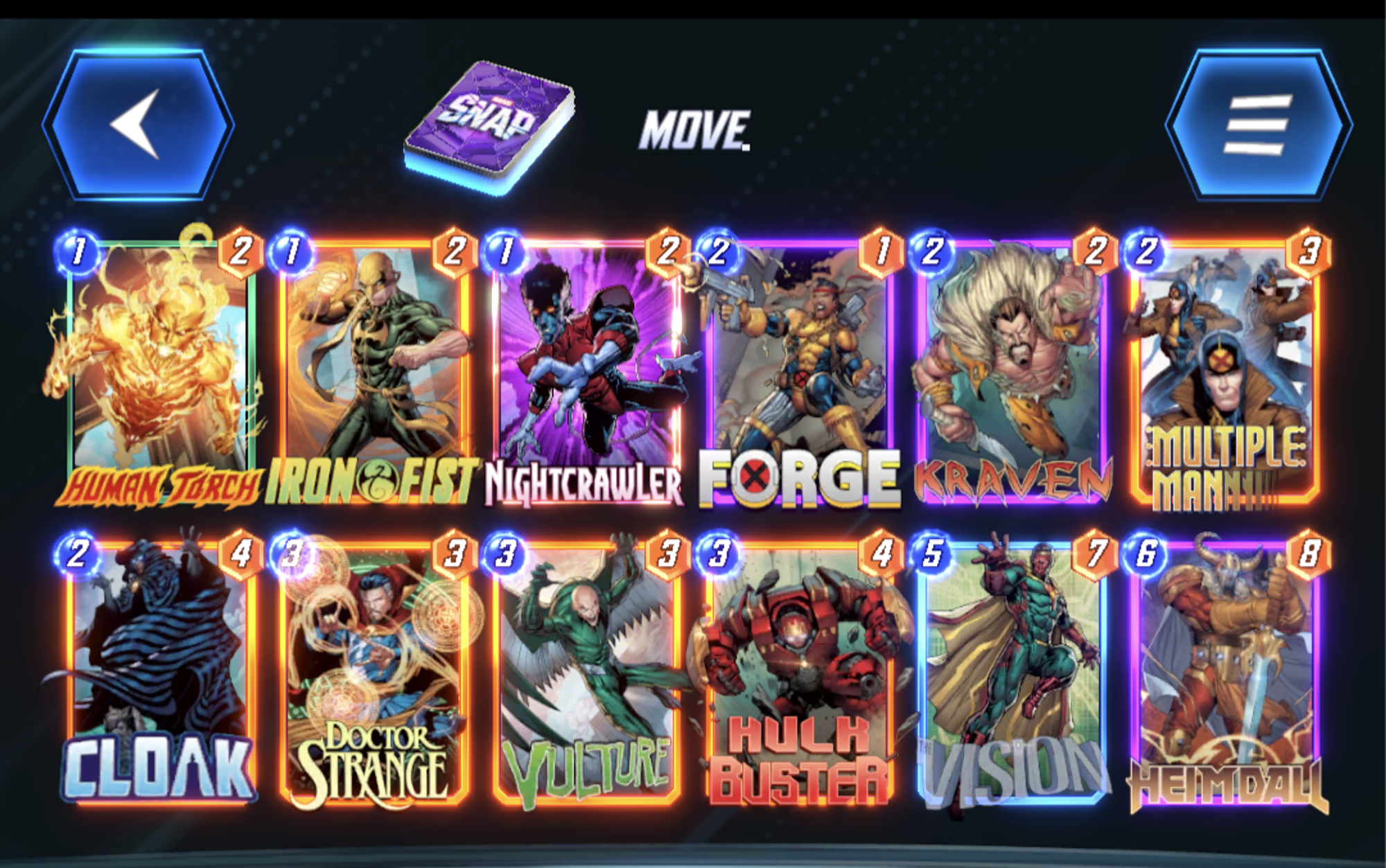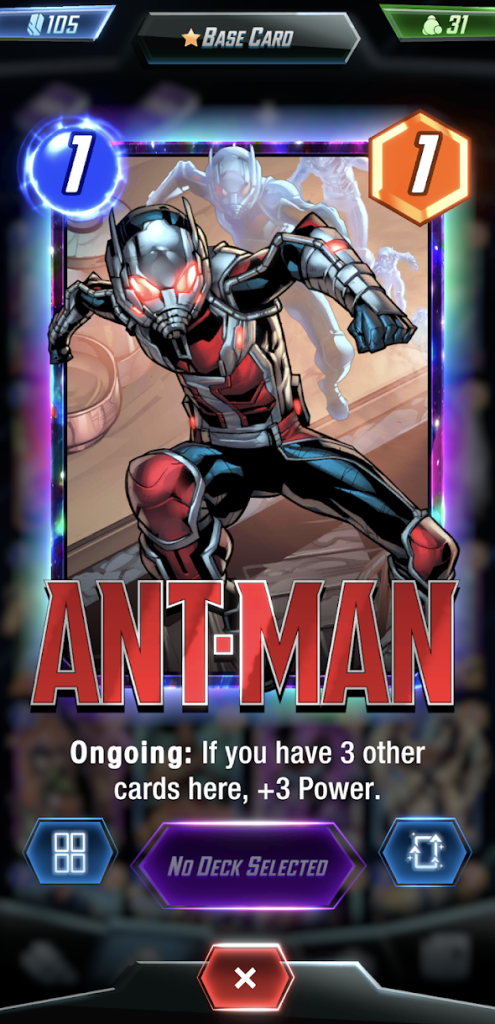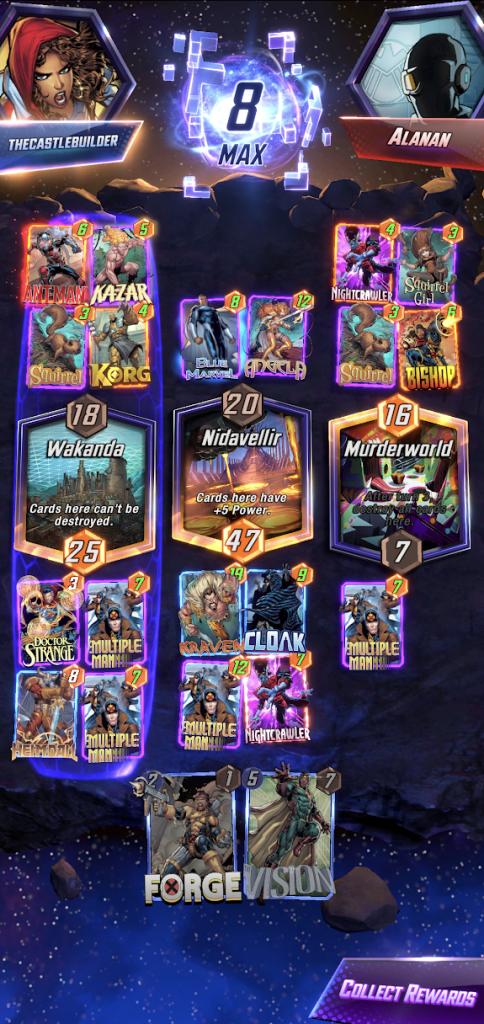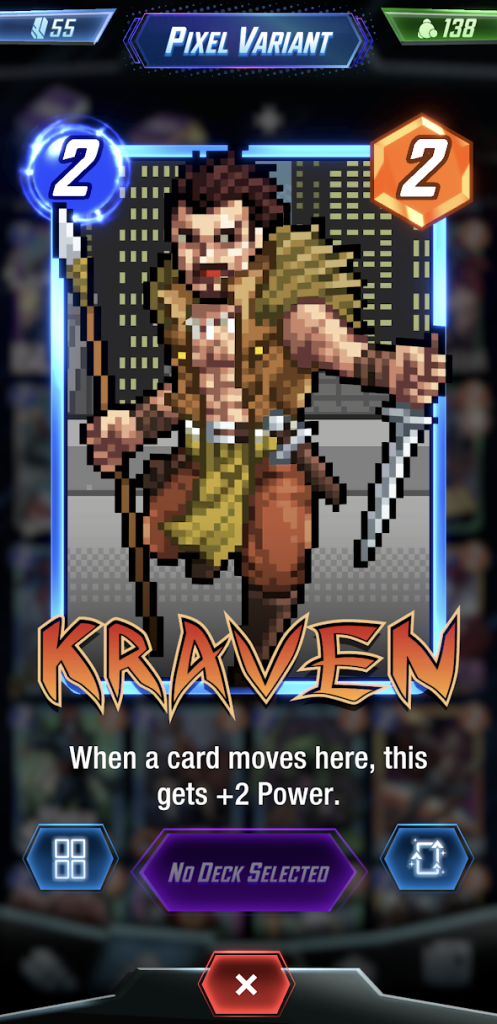
Marvel Snap is a collectible card game in which matches consist of accumulating points at three control nodes over six turns, and deciding a winner from the final tally. It’s clearly designed for mobile, but available on steam as well.
It’s also a game that consists almost exclusively of things I dislike: it’s a competitive card game with mobile game monetization, a betting and bluffing mechanic, and an endless parade of increasingly obscure Marvel characters with no real context of who they are.
Why, then, does this make the list? Well, let’s unpack those things I just said and I’ll try to explain.
Card Games For Casuals

I know folks who are into the Magic: The Gathering, the reigning king of collectible card games. Magic is beloved for its complexity and nuance, but is an infamously expensive and all-consuming hobby. Players who invest their time and energy are rewarded with a game that has incredible strategic depth (in both deckbuilding and play) and a variety of viable approaches.
But no matter how you spin it, getting into Magic is a decision. The knowledge and resources required to play it competently can be substantial. I’ve been intrigued by it before, but never enough to justify the investment.
Marvel Snap is an easier pill to swallow. It’s designed to be simple to learn, to have short matches, and to layer on complexities gradually — only after a baseline competency is established. The starting set of cards showcases some of the interactions that are possible in the game, but the more elaborate ones are withheld via the game’s progression engine. Decks consist of only 12 cards, which means that it’s relatively trivial to throw together a new one and try a different strategy.
Broadly speaking, collectible card games can evoke the appeal of a well-made plan coming together. Building a good deck and executing its synergies is like setting up dominoes and knocking them down, watching the pieces fall into place or scrambling to rearrange them when they stray. And where games like Magic reward deep knowledge and elaborate setups, Snap endeavors to condense the formula as much as it possibly can while retaining some of the depth.
I’ve never put any time into other casual-friendly CCGs like Hearthstone or Legends of Runeterra, and I suspect I’ll find enjoyment in them if I ever do. But Snap makes the initial commitment so staggeringly low that it’s very easy to see why it’s won people over.
I’ve Finally Snapped
One of the most unique elements to Marvel Snap is the eponymous “snap” (if you somehow don’t know the reference being made here, I envy your blissful ignorance). When playing against an opponent, players vie for cubes, an accumulated resource that allows them to advance (or regress) their rank. Each match awards a fixed amount of cubes; however, players can choose to increase the amount before the match is over. In turn, players can retreat from a match early to cut their losses.
It works something like this:
-
At the beginning of the match, there is 1 cube at stake for each player — sort of like an ante. This means that if a player retreats before the match ends, they lose 1 cube and their opponent gains 1 (there are additional nuances to this, but it doesn’t matter for this explanation).
-
On the final turn, the amount of cubes at stake doubles; at the end of the match, the winning player wins 2 cubes, and the losing player loses 2 cubes.
-
At any point during the match, each player has the ability to double the cubes at stake one time by pressing the cube icon at the top to “snap”. The total doesn’t update until the end of the turn (allowing players to retreat in response to a snap, before the stakes double).
-
This means that if both players snap before the match ends, the single cube at stake is doubled three times to a total of 8 cubes. Winner takes 8, loser loses 8.

This layer of mind games adds incredible texture to multiplayer matches. A confident player may snap early in an attempt to assure additional cubes, even if the opponent retreats later on. Or maybe a player will snap late in the game in an attempt to bluff their opponent and bait out a retreat. The snap mechanic also means that the stakes are highest when both players are confident in their victory.
I don’t usually care for betting mechanics like this, but it helps that it’s mediated through the game’s very limited communication (players can only send vague emotes back and forth). I never get too caught up in it the way that I do with social deduction games or bluffing games — and the nuance it adds to each match is undeniably exciting and helps generate fun stories to share with friends who play.
Who The Hell is Angela?
And finally, the Marvel characters. I don’t care much for Marvel comics and I care even less about the MCU, so I didn’t expect to feel anything about the card art or the characters included. But I really don’t mind the barrage of random characters in this game, and I think it’s because the roster is deployed differently than it is in the MCU.
When MCU movies hint at upcoming character debuts or reveal bits of deep lore, I mostly find it irritating. These movies are designed for close literal examinations (but not critical ones). These details are meant to hint at the grand creative plan of the MCU, teeing up endless “10 details you missed” articles and feeding the advertising machine. The inclusion of obscure comics lore details in the MCU almost always feels cynical, not celebratory.

In Marvel Snap, there’s a card for a guy called Rockslide. Who’s Rockslide? Let’s see… some mutant from X-Men. Who’s Angela? I guess she’s an angel bounty hunter from the Spawn comics. Huh, that’s cool. This backstory isn’t presented in Snap at all, and although some characters may be present on the sidelines of the MCU, there’s no special significance to their recurrence. The inclusion feels more like trivia and less like advertising.
The art itself is a mixed bag. Cards have variant art that can be either bought or acquired randomly through various progression systems. While some variants are objectively hideous (the pixel variants in particular are an afront to pixel art), some are stylish or fun. It’s also worth noting that the card art seems to inherit pretty much every problem with how comic book art depicts women and feminine bodies, which is unsurprising but still unfortunate.
Altogether, though, the strange ensemble of characters just feels like a bunch of weird little guys. It comes across less like One Big Advertisement than I was afraid of, and for that I have to give it some credit.
What About the Monetization?
Marvel Snap is still fundamentally a mobile game, and it’s using mobile game monetization tactics. I personally am not enthralled by the endlessly cycling store full of tantalizing bundles, currency packs, and card variants, but plenty of other people are susceptible. The game has a recurring season pass that seems to be a reasonable value proposition, which may help some folks to spend in moderation, but in the end I will always chafe against this sort of monetization.
When it comes to microtransaction-driven games, the question is never “is it exploitative?”, it’s “how exploitative is it?” I was on the fence about including this game in my list given how I feel about these tactics, but I couldn’t deny the fact that the game drew me in and has remained interesting (and mostly fair) even without me paying for anything. That is not, of course, an endorsement of how it monetizes, but it is worth recognizing that very good games can be just as guilty of it as your average skinner box shovelware game. For me, it’s worth talking about it and being introspective.
Conclusion
Marvel Snap has been fun for me because it fits into my life in a way that nothing else I play does. It’s easy to play casually in spare minutes, waiting for food to heat up, laying in bed, etc. It’s also something to chat about with friends, comparing strategies and celebrating victories with shared screenshots. It’s been a long time since I’ve stuck with a game like this, and it’s nice to find one that doesn’t demand all that much from me.